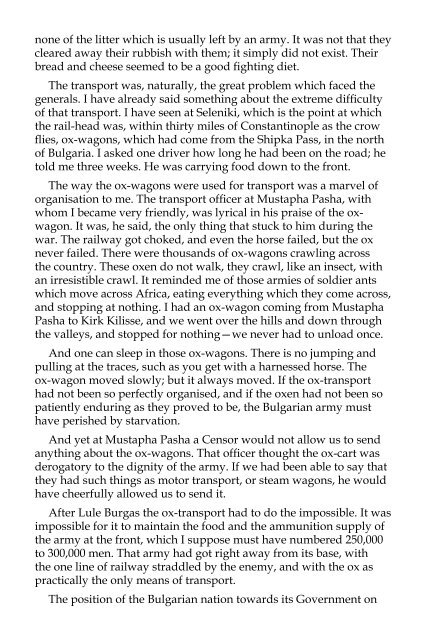Bulgaria e-book - iMedia
Bulgaria e-book - iMedia
Bulgaria e-book - iMedia
You also want an ePaper? Increase the reach of your titles
YUMPU automatically turns print PDFs into web optimized ePapers that Google loves.
none of the litter which is usually left by an army. It was not that they<br />
cleared away their rubbish with them; it simply did not exist. Their<br />
bread and cheese seemed to be a good fighting diet.<br />
The transport was, naturally, the great problem which faced the<br />
generals. I have already said something about the extreme difficulty<br />
of that transport. I have seen at Seleniki, which is the point at which<br />
the rail-head was, within thirty miles of Constantinople as the crow<br />
flies, ox-wagons, which had come from the Shipka Pass, in the north<br />
of <strong>Bulgaria</strong>. I asked one driver how long he had been on the road; he<br />
told me three weeks. He was carrying food down to the front.<br />
The way the ox-wagons were used for transport was a marvel of<br />
organisation to me. The transport officer at Mustapha Pasha, with<br />
whom I became very friendly, was lyrical in his praise of the oxwagon.<br />
It was, he said, the only thing that stuck to him during the<br />
war. The railway got choked, and even the horse failed, but the ox<br />
never failed. There were thousands of ox-wagons crawling across<br />
the country. These oxen do not walk, they crawl, like an insect, with<br />
an irresistible crawl. It reminded me of those armies of soldier ants<br />
which move across Africa, eating everything which they come across,<br />
and stopping at nothing. I had an ox-wagon coming from Mustapha<br />
Pasha to Kirk Kilisse, and we went over the hills and down through<br />
the valleys, and stopped for nothing—we never had to unload once.<br />
And one can sleep in those ox-wagons. There is no jumping and<br />
pulling at the traces, such as you get with a harnessed horse. The<br />
ox-wagon moved slowly; but it always moved. If the ox-transport<br />
had not been so perfectly organised, and if the oxen had not been so<br />
patiently enduring as they proved to be, the <strong>Bulgaria</strong>n army must<br />
have perished by starvation.<br />
And yet at Mustapha Pasha a Censor would not allow us to send<br />
anything about the ox-wagons. That officer thought the ox-cart was<br />
derogatory to the dignity of the army. If we had been able to say that<br />
they had such things as motor transport, or steam wagons, he would<br />
have cheerfully allowed us to send it.<br />
After Lule Burgas the ox-transport had to do the impossible. It was<br />
impossible for it to maintain the food and the ammunition supply of<br />
the army at the front, which I suppose must have numbered 250,000<br />
to 300,000 men. That army had got right away from its base, with<br />
the one line of railway straddled by the enemy, and with the ox as<br />
practically the only means of transport.<br />
The position of the <strong>Bulgaria</strong>n nation towards its Government on<br />
the outbreak of the war is, I think, extremely interesting as a lesson<br />
in patriotism. Every man fought who could fight. But further, every<br />
family put its surplus of goods into the war-chest. The men marched<br />
away to the front; and the women of the house loaded up the surplus<br />
goods which they had in the house, and brought them for the use<br />
of the military authorities on the ox-wagons, which also went to the<br />
military authorities to be used on requisition.<br />
The Shipka Pass





